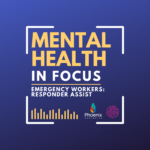-
Networks
About Networks
Continue readingConnecting mental health practitioners to improve multidisciplinary mental health care in Australia.
-
Webinars
Webinars
Learn moreMHPN’s interactive webinars feature case-based discussions and Q&A sessions led by top experts, modeling multidisciplinary practice and collaborative care.
-
Podcasts
Podcasts
All episodesOur podcasts feature local and international mental health experts in conversation on a variety of topics related to mental wellbeing, multidisciplinary practice, and collaborative care.
-
Compilations
Compilations
All compilationsExtend your knowledge and explore the following curated compilation of webinars, podcasts and networks, highlighting selected topics of interest.
About Networks
Connecting mental health practitioners to improve multidisciplinary mental health care in Australia.
Podcasts
Our podcasts feature local and international mental health experts in conversation on a variety of topics related to mental wellbeing, multidisciplinary practice, and collaborative care.
Webinars
MHPN’s interactive webinars feature case-based discussions and Q&A sessions led by top experts, modeling multidisciplinary practice and collaborative care.
Compilations
Extend your knowledge and explore the following curated compilation of webinars, podcasts and networks, highlighting selected topics of interest.












